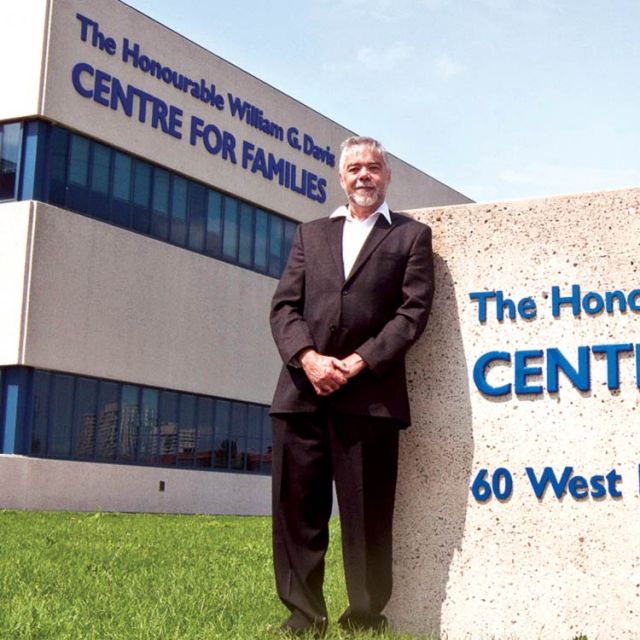BRAMPTON, ONT. - Catholic social workers in Brampton and Mississauga have found a new way to stand up for marriage by standing with as many allies as they can find.
Catholic Family Services Peel-Dufferin, a Catholic social work agency at the service of all families in the suburbs west of Toronto, is the lead agency for the Safe Centre of Peel, a family justice centre in the William G. Davis Centre for Families in Brampton.
“As Catholics, we can’t be afraid to lead,” said Mark Creedon, executive director of Peel-Dufferin Catholic Family Services.
Creedon has pulled together eight critical agencies that serve women and families faced with violence. Rather than being referred from one location to another to obtain housing, counselling, legal aid, medical advice, child care and more, at the Safe Centre it all happens in the same place. The idea is to deliver more effective and timely help and prevent women from giving up hope and returning to life with their abuser.
“Our purpose (at Catholic Family Services) is to preserve true marriages,” said Creedon. “If somebody goes into a marriage thinking his wife is his punching bag, well that’s not really a marriage.”
The Brampton Safe Centre isn’t the first Canadian family justice centre led by a Catholic agency. The former Catholic family services agency in Kitchener-Waterloo, now known as Mosaic, took the lead in establishing the Family Violence Project of Waterloo Region in 2006.
The idea of pooling and co-ordinating services to battered women in a single location started in San Diego, Calif., in 2002. Former City Attorney Casey Gwinn brought together police and social work agencies to form a united child abuse and domestic violence unit. To date, Gwinn’s National Family Justice Alliance has fostered and encouraged 80 family justice centres in the United States and 30 internationally from Amman, Jordan, to Sonora, Mexico.
“The fundamental issues are the same whether you’re in Canada, Mexico, Europe or anywhere else in the world,” Gwinn told The Catholic Register.
In the case of Canadian centres, having religious agencies lead the conglomerate of services is an advantage, he said.
“That spiritual care piece does make the Canadian model more vibrant. We struggle in the United States to get the spiritual care piece addressed in family justice centres,” he said.
Though it’s a Catholic agency that acts as landlord and instigator at the Safe Centre of Peel, the centre is able to connect clients with spiritual care for people of all faiths. The other agencies may not be Catholic, but they share values and a common purpose with Catholic Family Services, said Creedon.
“We’re dealing with excellent partner agencies that have great values which we share,” he said.
While Creedon has been able to get most of the critical services to buy in, he has struggled to get Peel Regional Police onside. The police are part of the Safe Centre’s steering committee and have worked out a protocol for getting victims from the Safe Centre to the police station. But they refuse to station officers already dedicated to domestic violence cases at the centre.
Peel Police claim their “best practice business model” involves working with the Safe Centre of Peel, but “does not involve the permanent stationing of officers within the facility,” Staff Sergeant Rob Higgs told The Catholic Register in an e-mail.
“It’s very shortsighted for law enforcement to say, ‘Oh, this isn’t really our thing,’ ” said Gwinn. “Law enforcement officers around the world are realizing they can’t do the job alone. They’re never going to arrest their way out of the problem.”
Peel Police responded to 2,042 criminal intimate relationship incidents in 2011 and another 6,554 verbal domestic occurrences. Overall, domestic calls in Peel have increased 13.99 per cent between 2008 and 2011, according to Higgs.
The more police come to the house and do no more than record the incident or negotiate temporary quiet, the more abusive men feel the law won’t touch them, said Gwinn.
“Empowered batterers are more likely to fight with police officers. Empowered batterers are more likely to kill police officers,” said Gwinn.
The repeat visits also cost taxpayers hundreds of thousands of dollars in police resources that don’t produce convictions, said Gwinn.
Creedon would like to persuade police to station officers at the Safe Centre, but for now hopes working effectively with police will convince the next chief to assign officers to the centre.
Getting this right is about much more than saving the police budget or getting more convictions. For Creedon, it’s about changing the direction for the next generation.
“One of the things we know about domestic violence is how much it is a generational thing,” he said. “So if you grow up in a family where your mother is getting abused — or it could be the father, but somebody is getting abused in that family — you are three times more likely to grow up to be an abuser or to be abused.”
Nationally the scale of the problem is immense. In 2007 there were more than 40,000 incidents of spousal violence reported to police, about 12 per cent of all police-reported violent crime in Canada, according to Statistics Canada. Women were the victims 83 per cent of the time.
“I totally believe there is something about being a Catholic family service agency that following the Catholic social justice values forces us to not walk away when we see tremendous injustice,” said Creedon.


